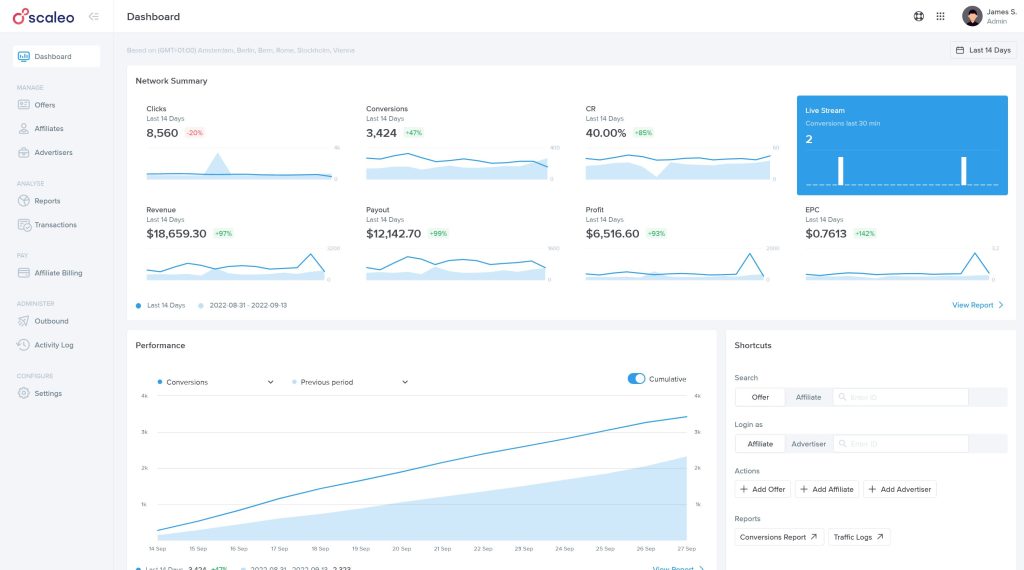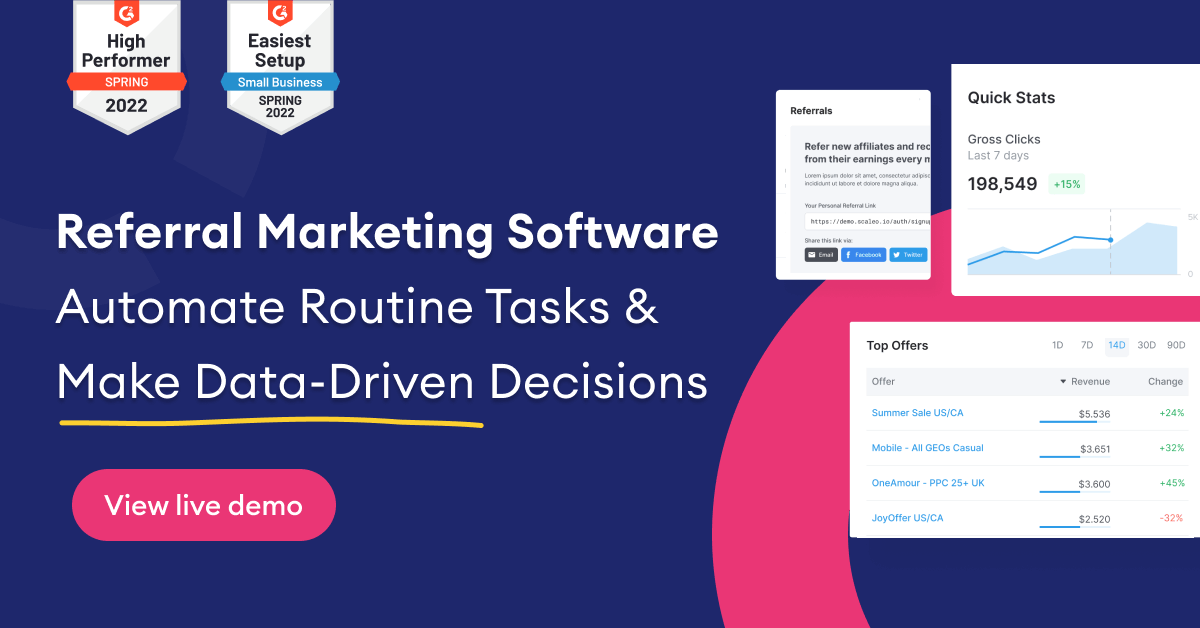Cookie session duration is one of the most essential elements to consider if you’re a merchant looking to launch an affiliate marketing program.
The cookie duration is the length of time that a customer’s browser will remember that they clicked through from an affiliate link. It’s vital because if a customer visits your store from an affiliate link and then makes a purchase later, the affiliate who sent the customer usually receives credit for the purchase—but only if their cookie is still active.
Setting an optimal cookie duration can be tricky. If it’s set too short, you might miss out on potential conversions, but if it’s set too long, you might be offering your affiliates too much of a reward.
In this blog post, we’ll look at how you can get the balance right and set a perfect cookie duration for your affiliate marketing program.
Let’s dive in!
Why Does Cookie Duration Matter in Affiliate Marketing?
Setting the right cookie duration for your affiliate marketing program is essential for a successful program. A cookie duration is the length of time that a cookie lasts for, and when it comes to affiliate marketing, being able to track customers accurately and efficiently is key to earning more revenue.
When it comes to setting the perfect cookie duration, it can be tricky. Too long, and you risk losing sales from customers who click through and buy from your affiliates before their cookies expire; too short, and you won’t be able to track or account for sales generated through your program.
The best practice for affiliate marketers is to set the cookie duration somewhere in the middle—you want it long enough to get credit for all sales generated, but not so long that customers decide to purchase elsewhere before their cookies expire.
Remember: customers don’t just shop once these days—research shows that they typically visit up to four sites and consult five sources before making a purchase. Think carefully about what length will work best for your program.
How Long Should the Cookie Duration Be?
The cookie duration is the amount of time your affiliate program keeps track of your customer’s activities before referring them to you again. The right cookie duration can make or break your affiliate marketing program, as it needs to meet the needs of both parties involved.
When setting the cookie duration, consider that shorter durations will encourage affiliates to drive more traffic to your website, while longer durations will allow them to earn from a larger customer base. The ideal cookie duration should be long enough for customers to return and make multiple purchases but short enough for affiliates to dedicate themselves and incentivize customers.
A good starting point would be between 30-90 days, depending on the product/service you’re offering and industry trends.
This length of duration gives customers enough time to make their decisions, as most online purchases are not made on impulse. At the same time, this allows affiliates enough time to follow up with their referrals and build customer loyalty over a longer period of time.
Pros and Cons of Short Cookie Durations
Short cookie durations certainly have their advantages and disadvantages.
On the one hand, they can provide affiliates with more frequent payment cycles, allowing them to more quickly recognize the rewards for the valuable traffic they are driving.
On the other hand, short cookie durations may lead to fewer conversions, which translates to fewer commissions for affiliates.
The 3 main pros and cons of short cookie durations can be summarized as follows:
| Pros | Cons | |
|---|---|---|
| 1 | Affiliates receive payments more frequently | Shorter time periods between initial interest and actual conversions |
| 2 | Short-term success can be recognized more easily | Potentially leads to fewer conversions overall |
| 3 | Easier to customize payments in relation to promotion activities | Less long-term potential for overall program growth |
Pros and Cons of Long Cookie Durations
Choosing a cookie duration is an important decision for affiliate marketers. It affects how an affiliate’s performance is rewarded, how your products are promoted, and even how customers make their purchases.
But there are pros and cons to each duration and timing. Let’s take a look at the pros and cons of choosing a long cookie duration:
Pros of Long Cookie Durations
- Encourage affiliates to develop long-term customer relationships by offering rewards for repeat purchases over time.
- Improved customer satisfaction by keeping customers in the same purchase cycle, rather than starting from scratch after every purchase.
- Offers incentives for affiliates to be more creative in creating promotional campaigns that get potential buyers interested in your products or services over time.
Cons of Long Cookie Durations
- Can reduce the ability of affiliates to quickly deliver high-performing campaigns due to the time it takes to generate sales through long-term efforts.
- This can create confusion for customers who may find themselves buying from multiple affiliates within the same cookie duration, resulting in fewer commissions for any single affiliate.
- May reduce customer loyalty if they feel as though they are constantly being asked to repurchase or become part of a new purchase cycle with each visit to your site or store.
How to Change Your Affiliate Cookie Duration
When setting a cookie duration for your affiliate marketing program, you want to balance keeping your affiliates engaged and providing customers with the best value. Luckily, making changes to your affiliate cookie duration is a straightforward task that requires minimal effort. Here’s how to do it:
Step 1: Analyze Your Current Cookie Duration
Before making any changes, you need to look at your current cookie duration or default setting. This can be done by reviewing your affiliate dashboard or looking through your analytics data.
Step 2: Review Your Affiliate Network
Once you have determined the length of time of your current cookie duration, it’s time to review the rules of each network in which you participate. Each network imposes different cookie policies so make sure you are following the ones that apply.
Step 3: Test Different Durations
Now it’s time to test out different cookie durations and see what works best for your program – beginning with shorter durations, such as 7 days and then increasing it incrementally over time to up to 60 days or more if needed.
By experimenting with different cookie durations for your affiliate program, you can better understand customer behavior and increase conversions – thereby increasing the success of your program overall.
Top Affiliate Networks and Their Default Cookie Durations
When running a successful affiliate marketing program, it is essential to know the default cookie duration of the top affiliate networks on the market.
Commission Factory
Commission Factory has a standard cookie duration of 30 days, so any customer who clicks on your website within that period will be recognized as an affiliate sale. This period can be further extended depending on the specific needs of your program.
Clickbank
The default cookie duration for Clickbank is 60 days, giving customers an added incentive to make purchases before their session expires. However, this time frame may be subject to change depending on the agreement between you and your affiliates.
By familiarizing yourself with the default cookie durations available from these top networks in the industry, you can optimize your cookie duration policy for maximum efficiency.
Remember—the shorter the time frame, the higher conversion rates you’re likely to see.
Why Choose Scaleo to Power Your Affiliate Program?
If you’re looking for a reliable and flexible way to power your affiliate program, try Scaleo. Scaleo is a leader in the field, offering several advantages that make it the perfect choice.

Cloud-Based Platform
Scaleo’s cloud-based platform allows for easy access from anywhere and is scalable to grow with your business. You can manage different programs from a single dashboard, making it easy to keep track of activity, commissions and other data points.
Flexible Cookie Duration
Scaleo offers flexible cookie duration configurations so you can choose the length that works best for your program. You can customize the duration from anywhere between 3 days up to 1 year, giving you complete control over how long customers have to make a purchase for you to receive commission credit.
This ensures that even if customers don’t purchase directly on their first visit, you’ll still be able to track them after they leave your site and get rewarded when they come back and complete their purchase within the cookie duration timeframe.

Conclusion
As an affiliate, it’s important to think about the cookie duration when selecting an affiliate program. A cookie duration that is too short may reduce the chance of conversions and too long may reduce the lifetime revenue potential. It’s important to have a thorough understanding of how cookies work and what cookie duration will best suit an affiliate’s needs.
To maximize the success of an affiliate program, the cookie duration should be tailored to the individual affiliate’s goals. Consider their target audience, the type of product they are selling, the competitive landscape and industry standards when deciding on the cookie duration. With the right cookie duration, affiliates can maximize their lifetime revenue and create a successful, long-term affiliate marketing program.
Affiliate Marketing Cookie Session Duration FAQ
Cookie duration in affiliate marketing refers to the time period for which a tracking cookie, placed on a user’s device when they click an affiliate link, remains active. This duration is important because it determines the window during which affiliates can earn a commission if the user makes a purchase or completes another predefined action.
Longer cookie durations provide affiliates with a greater opportunity to earn a commission, as users have more time to make a purchase after clicking the affiliate link. This can lead to higher conversion rates, as affiliates are motivated to promote your products and attract more potential customers.
Factors to consider when setting cookie duration include the type of product or service being promoted, the average buying cycle, industry standards, and your affiliates’ preferences. You should also consider the balance between providing a fair opportunity for affiliates to earn commissions and ensuring the effectiveness of your marketing spend.
Longer cookie durations generally lead to higher earnings for affiliates, as they have a larger window to earn commissions. This can increase their motivation to promote your products and generate more sales. However, excessively long durations may not provide additional benefits and could lead to increased marketing costs.
Cookie durations can vary widely across industries, but some common durations include 30, 60, or 90 days. However, it’s essential to consider your specific business and affiliate partners when setting your program’s cookie duration.
Using an affiliate tracking platform, you can set up custom cookie durations for different partners or campaigns. This allows you to optimize your program by offering more extended durations for high-performing affiliates or adjusting durations based on specific promotional strategies.
Yes, advanced affiliate marketing platforms allow you to implement dynamic cookie durations based on user behavior, traffic source, or other variables. This can help you optimize your program by rewarding high-value traffic and adjusting cookie durations according to user engagement.
First-click attribution gives credit to the affiliate who first referred the user, while last-click attribution credits the affiliate who provided the final referral before the user completed a desired action. Cookie duration plays a role in both attribution models, as it determines the window during which affiliates can earn a commission.
Using an affiliate tracking platform, you can monitor the performance of your program, including conversion rates, average order value, and other key metrics. By analyzing this data, you can identify trends and optimize your program by adjusting cookie durations to improve performance and maximize ROI.
Yes, privacy regulations such as the GDPR and CCPA require transparency and user consent for storing cookies on their devices. It’s essential to ensure that your affiliate program complies with relevant laws and that users are informed about the cookies being used, their purpose, and their duration.
Last Updated on August 29, 2023





